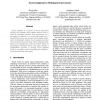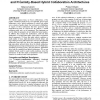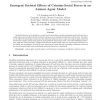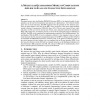376 search results - page 2 / 76 » Evaluating a computational model of social causality and res... |
ATAL
2004
Springer
14 years 1 months ago
2004
Springer
Social judgment is a process of social explanation whereby one identifies which entities deserve credit or blame for multiagent activities. Such explanations are a key aspect of i...
CSCW
2006
ACM
14 years 1 months ago
2006
ACM
We evaluate response times, in N-user collaborations, of the popular centralized (client-server) and replicated (peer-to-peer) architectures, and a hybrid architecture in which ea...
ACAL
2009
Springer
13 years 11 months ago
2009
Springer
Societal behaviour can be studied at a causal level by perturbing a stable multi-agent model with new microscopic behaviours and observing the statistical response over an ensembl...
IPPS
1998
IEEE
13 years 12 months ago
1998
IEEE
The paper presents how the Random PROLOG Processor (RPP), a bio-inspired model of computations, can be used for formalization and analysis of a phenomenon - the Collective Intelli...
IJAR
2007
2007
On representation and aggregation of social evaluations in computational trust and reputation models
13 years 7 months ago
Interest for computational trust and reputation models is on the rise. One of the most important aspects of these models is how they deal with information received from other indi...




